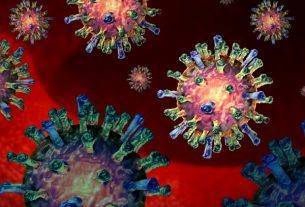Malaria remains a deadly threat for pregnant women in sub-Saharan Africa, often leading to miscarriage, stillbirth, low birthweight and serious illness.
Now, an EU-funded collaborative research project is aiming to protect women before they become pregnant – an approach that could transform maternal and newborn health in regions where malaria is endemic.
Dr Flavia D’Alessio heads vaccine research at the European Vaccine Initiative (EVI) in Heidelberg, Germany, and is coordinating the five-year ADVANCE-VAC4PM project that runs until 2027. She explained the rationale behind the initiative.
“When a woman becomes pregnant for the first time, she is particularly vulnerable to malaria. The parasite infects red blood cells that can then pass into the placenta and accumulate there, causing very adverse outcomes for both mother and baby.”
The aim is to develop a vaccine for adolescent girls who have never been pregnant. Like the HPV vaccine given to teenagers to prevent cervical cancer, it would offer long-lasting protection for women once they begin childbearing.
Human impact
The potential impact is huge. According to the World Health Organization (WHO), malaria in pregnancy is linked to between 75 000 and 200 000 infant deaths each year, and more than 800 000 low-birthweight babies.
Placental malaria, as it is known, can also cause anaemia and high blood pressure in mothers, particularly during first pregnancies.
“
When a woman becomes pregnant for the first time, she is particularly vulnerable to malaria.
The vaccines in development target a malaria parasite protein called VAR2CSA, which allows infected red blood cells to bind to placental tissue. Blocking this protein may not prevent infection, but it would protect pregnant women and their babies from the most dangerous consequences.
Two vaccine candidates are in development: PAMVAC, created by the University of Copenhagen in Denmark, and PRIMVAC, developed by the French National Institute of Health and Medical Research (INSERM) in Paris. Both target similar regions of the same protein.
To boost efficacy, researchers are exploring a new approach using virus-like particles – non-infectious structures that mimic viruses and help trigger a stronger immune response. They’re also testing whether combining PRIMVAC with a virus-like particle version of PAMVAC could offer broaden protection against the disease.
Early progress
Early trials have shown encouraging results. Both of the vaccine candidates are safe, well tolerated and capable of producing a strong immune response.
The critical next step is to see whether this immune response translates into real protection. Researchers will follow vaccinated women from the time they receive the shot through pregnancy and delivery of their first child to assess whether they develop fewer cases of placental malaria than unvaccinated women.
“We will need to follow women through this entire period to demonstrate protection,” said D’Alessio.
If successful, the vaccines will then undergo rigorous testing before national regulatory approval and WHO prequalification are obtained, paving the way for wide-scale production and distribution.
International collaboration
The ADVANCE-VAC4PM consortium brings together 10 leading research institutions from Europe and Africa, all with extensive experience in malaria vaccine development. Key partners include institutions from France, Denmark, the Netherlands, Ghana, Malawi, Burkina Faso and Benin.
Overall coordination is being led by EVI, a non-profit product development partnership working to accelerate safe, effective and affordable vaccines for diseases that disproportionately affect low- and middle-income countries.
EVI itself is also supported by the EU, including through key European partnerships such as the Innovative Health Initiative and the European and Developing Countries Clinical Trials Partnership, along with national governments and other international organisations.
The research builds on earlier work on these two vaccine candidates also led by EVI and supported by the Japan-based Global Health Innovation Technology Fund, highlighting the international nature of the collaboration.
Trials in Africa
In Burkina Faso, preparations are underway for field trials led by Professor Sodiomon Sirima and his team at Groupe de Recherche Action en Santé, a non-governmental biomedical research organisation in Ouagadougou.
Previous studies involved vaccinating a group of non-pregnant adult women with no history of previous pregnancies. Early findings confirmed a good immune response.
“Now we need to see whether these defences are maintained once the girls become sexually active and later pregnant,” said Sirima, a leading expert in malaria vaccine research and control strategies.
Depending on the number of pregnancies recorded among participants, this phase could take up to two years.
“The goal is to find a vaccine that is safe and generates a long-lasting protective immune response,” he stressed.
“If vaccinated women end up having fewer miscarriages, stillbirths and low-weight babies, this will be a tremendous achievement for the vaccine and the malaria research community as a whole.”
Working alongside existing tools
If approved, the vaccine will complement existing malaria prevention strategies. These include insecticide-treated bed nets and intermittent preventive treatment in pregnancy (IPTp) – a monthly course of medication recommended by WHO in regions where malaria is endemic.
“
The goal is to find a vaccine that is safe and generates a long-lasting protective immune response.
IPTp has been shown to reduce perinatal mortality by about 27 % among women in their first or second pregnancies. But the drug is not always available in rural areas, resistance to it is emerging, and it cannot be taken during the first trimester – precisely when women are most susceptible to infection.
“This is another reason why a vaccine is so badly needed,” stressed D’Alessio.
Beyond clinical research, the ADVANCE-VAC4PM team is also heavily invested in capacity building. This includes training postgraduate students, mentoring African early-career researchers, strengthening local laboratory capacity, and developing digital tools for monitoring pregnancy outcomes in preparation for larger scale efficacy trials.
Modelling will also be carried out to assess the cost-effectiveness, feasibility and acceptability of the vaccine.
Looking ahead
The path to a vaccine for placental malaria is long, but the momentum is growing.
With two promising candidates in advanced development, coordinated international trials underway, and clear support from European and African partners, the prospect of protecting mothers and babies from one of malaria’s most devastating complications is closer than ever.
If successful, the vaccine could prevent thousands of maternal and infant deaths every year. For families across Africa and beyond, it would mean safer pregnancies, healthier babies, and new hope in the fight against one of the world’s deadliest diseases.
Research in this article was funded by the EU’s Horizon Programme. The views of the interviewees don’t necessarily reflect those of the European Commission. If you liked this article, please consider sharing it on social media.


